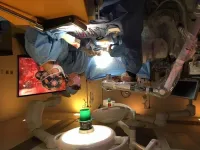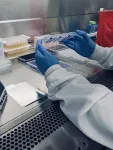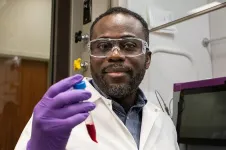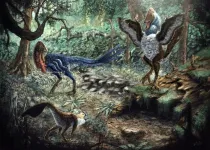(Press-News.org) MSU has a satellite uplink/LTN TV studio and Comrex line for radio interviews upon request.
Images
EAST LANSING, Mich. – Thousands of types of bacteria live in the human gut. They help digest the food we eat and absorb nutrients, but these bacteria don’t just do this to be kind to humans, there is a benefit for them too.
Elizabeth Heath-Heckman, an assistant professor in the College of Natural Science, has received a five-year National Institutes of Health grant from the National Institute for General Medical Sciences totaling $1.9 million to support her research studying the bacteria animals like squid and newts use to protect themselves. This research could provide insights into how humans maintain beneficial bacteria in their gut.
Specifically, this NIH Maximizing Investigators’ Research Award, or MIRA grant, will focus on how animals make sure that the bacteria that live with them are cooperating in a mutually beneficial way.
Heath-Heckman and her team study the beneficial relationship between the Hawaiian bobtail squid and the luminous bacteria contained in its light organ that glows to camouflage the squid from predators.
“I’m really interested in learning how the squid ensures the bacteria keeps making light,” said Heath-Heckman. “This is costly for the bacteria but likely essential for the squid to protect itself.”
Studying ways bacteria can help animals defend themselves against predators led Heath-Heckman to collaborate with Heather Eisthen, a professor in the College of Natural Science, and her lab’s research with rough-skinned newts. Bacteria on the newt’s skin produce tetrodotoxin, or TTX, which is extremely toxic to animals that eat the newts.
“Both the squid and the newt have defensive symbiotic relationships where they use their bacteria to avoid being eaten,” said Heath-Heckman. “But in either case, they’re both animals and they both are interacting with bacteria that are as different from them as our bacteria are different from us.”
Heath-Heckman has been exploring the way squid “talk” to their bacteria and applying that model to human gut health.
“We can apply these basic principles that underpin how bacteria, and their hosts, are associating with each other and use that to find commonalities in terms of strategy or ecological or evolutionary principles across those systems,” said Heath-Heckman. “This project is very much at the nexus of health, evolution, developmental biology and immunology.”
###
Michigan State University has been advancing the common good with uncommon will for more than 165 years. One of the world’s leading public research universities, MSU pushes the boundaries of discovery to make a better, safer, healthier world for all while providing life-changing opportunities to a diverse and inclusive academic community through more than 400 programs of study in 17 degree-granting colleges.
For MSU news on the web, go to MSUToday or twitter.com/MSUnews.
END
How studying defensive bacteria may help human gut health
2024-01-24
ELSE PRESS RELEASES FROM THIS DATE:
Study: This protein may be the ‘glue’ that helps COVID virus stick
2024-01-24
When SARS-CoV-2 enters the human body, the virus’ spike protein binds to a cell, allowing the virus to infiltrate and begin replicating.
A new study from Tulane University, conducted in partnership with Florida International University and published in Protein Science, has identified a protein that may be the glue that helps COVID’s spike protein stick.
The study found that a small piece of a proteoglycan called perlecan LG3 – a protein most commonly found in blood vessels and the brain – ...
Can we predict when a migraine attack will occur?
2024-01-24
EMBARGOED FOR RELEASE UNTIL 4 P.M. ET, WEDNESDAY, JANUARY 24, 2024
MINNEAPOLIS – Migraine is often underdiagnosed and untreated, and even when it is treated, it can be difficult to treat early enough as well as find strategies to prevent attacks. A new study looks at ways to more accurately predict when a migraine will occur—through the use of mobile apps to track sleep, energy, emotions and stress—to enhance the ability to prevent attacks. The study is published in the January 24, 2024, online issue of Neurology®, the medical journal of ...
Researchers suggest changing gold standard of spine surgery from operative microscope to 3D exoscope
2024-01-24
While surgeons have more commonly used the exoscope in various intracranial procedures, its use in spinal surgery has been underreported.
Researchers and neurosurgeons at the Medical University of South Carolina (MUSC) retrospectively compared the operative microscope to the 3D exoscope in a recent study published in World Neurosurgery and found better outcomes among both surgeons and patients when using the exoscope.
Stephen Kalhorn, M.D., FAANS, was the principal investigator on the study, and he says the traditional operative microscope has ...
ORNL wins five Federal Laboratory Consortium awards
2024-01-24
Researchers, staff members and licensees from the Department of Energy’s Oak Ridge National Laboratory received top honors in the Federal Laboratory Consortium’s annual awards competition for excellence in technology transfer, excellence in technology transfer innovation, outstanding researcher and regional technology transfer.
The Federal Laboratory Consortium, or FLC, recently announced 32 award winners, ORNL included, for contributions to technology transfer, which turns cutting-edge research into impactful products and services. The FLC represents more than 300 federal laboratories, agencies and research centers ...
Foodborne-pathogen Listeria may hide from sanitizers in biofilms
2024-01-24
UNIVERSITY PARK, Pa. — An estimated 1,600 people in the U.S. contract a serious infection from Listeria bacteria in food each year and, of those individuals, about 260 people die, according to the Centers for Disease Control and Prevention. Penn State researchers may now better understand how the bacteria, called Listeria monocytogenes, survive and persist in fruit-packing plants by evading and surviving sanitizers.
According to their study, which is now available online and will be published in the June issue of the journal Biofilm, biofilms — comprising otherwise harmless microorganisms that attach to each ...
Purdue Innovates awards Purdue researchers $150K to develop innovations for the marketplace
2024-01-24
WEST LAFAYETTE, Ind. – Four researchers in Purdue University’s colleges of Engineering and Science, the Purdue Institute for Cancer Research and the Purdue Institute for Drug Discovery have received a total of $150,000 from the Trask Innovation Fund to strengthen the appeal of their patent-pending intellectual property for commercial use.
The fund is managed by the Purdue Innovates Incubator, which provides programming for the Purdue University community to ideate, refine and support their solutions. The fund awards up to $50,000 for short-term projects that enhance the commercial value of Purdue intellectual ...
JMIR Bioinformatics and Biotechnology invites submissions for research papers on machine learning-driven genomic predictive models
2024-01-24
JMIR Publications is pleased to announce a new theme issue titled “Machine Learning-Based Predictive Models Using Genomic Data” in JMIR Bioinformatics and Biotechnology. The peer-reviewed journal is indexed in SCOPUS and focused on research in bioinformatics, computational biology, and biotechnology. This new theme issue aims to explore cutting-edge research at the intersection of machine learning and genomics, fostering advancements in predictive modeling for biological insights.
JMIR Bioinformatics and Biotechnology welcomes contributions from global researchers, educators, and practitioners. We encourage submissions exploring diverse aspects of bioinformatics ...
Humpback whales move daytime singing offshore, research reveals
2024-01-24
Humpback whale singing dominates the marine soundscape during winter months off Maui. However, despite decades of research, many questions regarding humpback whale behavior and song remain unanswered. New research revealed a daily pattern wherein whales move their singing away from shore throughout the day and return to the nearshore in the evening. The findings were led by the University of Hawaiʻi, in partnership with NOAA’s Hawaiian Islands Humpback Whale National Marine Sanctuary, and published in Royal Society Open Science.
“Singers may be attempting to reduce the chances of their song being drowned ...
New oviraptor dinosaur from the US Hell Creek Formation lived at the end of the Age of Dinosaurs and weighed about the same as an average woman
2024-01-24
New oviraptor dinosaur from the US Hell Creek Formation lived at the end of the Age of Dinosaurs and weighed about the same as an average woman
###
Article URL: https://journals.plos.org/plosone/article?id=10.1371/journal.pone.0294901
Article Title: A new oviraptorosaur (Dinosauria: Theropoda) from the end-Maastrichtian Hell Creek Formation of North America
Author Countries: USA, Canada
Funding: Funding for histology processing provided to HNW by Oklahoma State University for Health Sciences. Funding to GFF provided by the Royal Society (Grant NIF\R1\191527) and a Banting Fellowship ...
Galápagos penguin is exposed to and may accumulate microplastics at high rate within its food web, modelling suggests
2024-01-24
Modelling shows how microplastics may bioaccumulate in the Galápagos Islands food web, with Galápagos penguins most affected, according to a study published January 24, 2024 in the open-access journal PLOS ONE by Karly McMullen from the University of British Columbia, Canada, under the supervision of Dr. Juan José Alava and Dr. Evgeny A. Pakhomov of the Institute for the Ocean and Fisheries, University of British Columbia, Canada, and colleagues.
We know that microplastics are building up in our oceans, but the extent of the damage to marine organisms is still being assessed. Here, McMullen and colleagues focused ...






